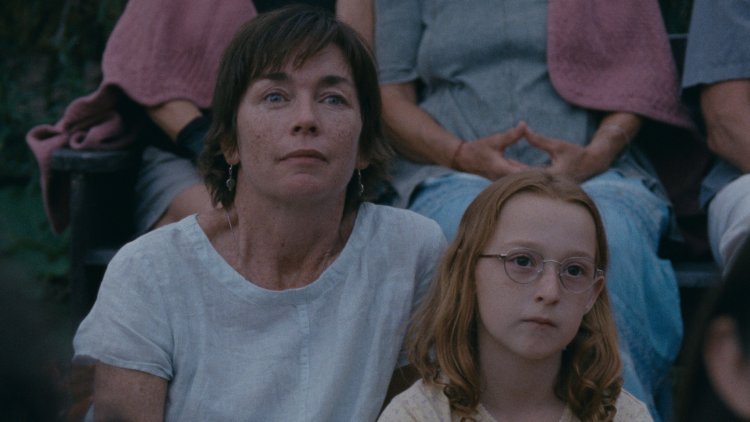A Pulitzer-Winning Playwright Makes a Great Cinematic Leap
Annie Baker’s debut film, Janet Planet, is an affecting tale of existential wandering.

The Pulitzer Prize–winning playwright Annie Baker has long been a master of silence; her work delights in long, sometimes torturous pauses, letting audiences fill in emotional gaps themselves. I first discovered her work when I saw the off-Broadway play Circle Mirror Transformation 15 years ago and was immediately convinced of her dramatic prowess—the way she built up a pressurized atmosphere, and commanded a hushed crowd to await the line of dialogue that might puncture the air. Given how specific these qualities are to a theater environment, I would not have predicted that Baker could make the leap to cinema so easily.
I shouldn’t have worried. Janet Planet, Baker’s filmmaking debut, is also filled with still moments—but rather than playing to total quiet, its dialogue-free sequences are suffused with little buzzes, chirps, and other ambient noises. Set in rural western Massachusetts in 1991, Janet Planet follows a quasi-hippie mother named Janet (played by Julianne Nicholson) as she navigates single parenthood and her faltering love life alongside her awkward but bluntly charming daughter, Lacy (Zoe Ziegler). The film somehow captures how the air sounds and feels in every season, turning the quiet hum of nature into a character itself.
Like some of Baker’s great plays—such as The Flick, The Antipodes, and the recent Infinite Life—this film is an involving and affecting tale. Yet it’s also disarmingly taciturn and small-scale; not until a few weeks after seeing it did I realize how deeply Janet Planet had burrowed in my brain. Baker’s characters are people you might identify with, in all their flaws and charm, but their behavior sometimes feels deeply irrational; out of nowhere, the story will shift in an unusual direction. At first the effect might be jarring, but it reflects how life can sometimes feel: jagged, treacherous, and thrilling.
Janet Planet is the name of an acupuncture clinic Janet has set up, a refuge following a string of romantic failures. She’s a bit of a seeker, someone looking for answers to life’s mysteries amid the sea of alternative lifestyles in western Massachusetts. When the film begins, Lacy has been sent to summer camp—and one night, she picks up the communal phone and portentously announces to her mother, “I’m gonna kill myself if you don’t come get me.” It’s an overly dramatic threat, but delivered with enough conviction to bring her home, where she hangs out for the rest of the summer with only weirdo adults for company. From there, the film moves through three distinct chapters, each revolving around a person who passes through Janet’s life and alters it somehow. We meet a moody older boyfriend named Wayne (Will Patton), an old friend named Regina (Sophie Okonedo) who becomes a temporary roommate, and a quasi–cult leader named Avi (Elias Koteas) who holds a lingering romantic sway over Janet.
[Read: The real roots of midlife crisis]
Janet, played with a beguiling mix of weary chilliness and melancholic openheartedness by Nicholson, is ostensibly the main character. But Lacy is the audience’s eyes, as someone both enamored and skeptical of her quietly chaotic mom. The film is about their bond, and about how much trouble they have knowing each other, as Janet stumbles through life in search of connection and Lacy approaches adulthood with trepidation. Baker is an empathetic storyteller, and she’s unafraid of highlighting her characters’ flaws, winning the viewer over with their mistakes rather than snappy dialogue or heroic little acts.
Baker’s skill with character and narrative subtlety is a given, though. What impressed me most about Janet Planet is what a work of cinema it is, visually alive and inventive even with a small budget and fairly languid plotting pace. The patch of existence Janet occupies—crunchy farmhouses, worn dirt roads, and the constant din of insects—can be warm and welcoming one moment and oppressive the next. As Lacy rattles around in a bucolic paradise, she also chafes against feelings of loneliness and alienation. Will adulthood bring understanding, or will she keep navigating life as uncomfortably as her mom does? That’s Annie Baker’s world, one where life is beautiful and crushing all at once.
What's Your Reaction?




















